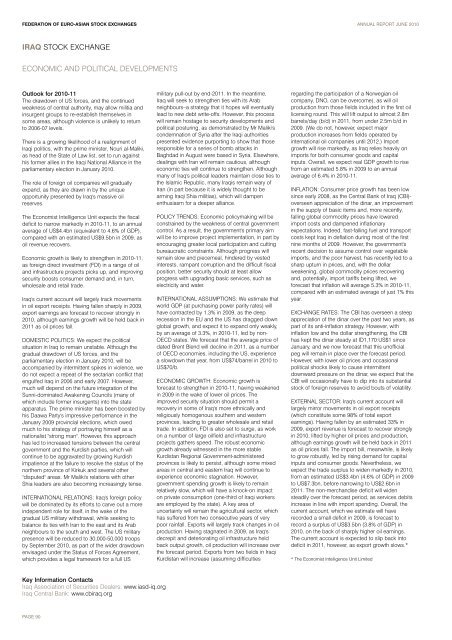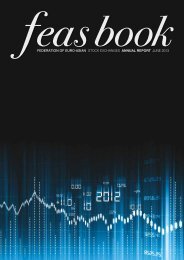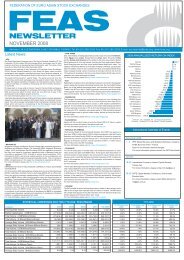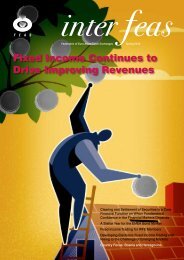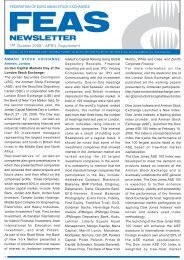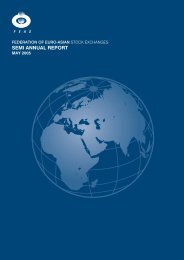Download - FEAS
Download - FEAS
Download - FEAS
- No tags were found...
Create successful ePaper yourself
Turn your PDF publications into a flip-book with our unique Google optimized e-Paper software.
FEDERATION OF EURO-ASIAN STOCK EXCHANGES ANNUAL REPORT JUNE 2010IRAQ STOCK EXCHANGEECONOMIC AND POLITICAL DEVELOPMENTSOutlook for 2010-11The drawdown of US forces, and the continuedweakness of central authority, may allow militia andinsurgent groups to re-establish themselves insome areas, although violence is unlikely to returnto 2006-07 levels.There is a growing likelihood of a realignment ofIraqi politics, with the prime minister, Nouri al-Maliki,as head of the State of Law list, set to run againsthis former allies in the Iraqi National Alliance in theparliamentary election in January 2010.The role of foreign oil companies will graduallyexpand, as they are drawn in by the uniqueopportunity presented by Iraq's massive oilreserves.The Economist Intelligence Unit expects the fiscaldeficit to narrow markedly in 2010-11, to an annualaverage of US$4.4bn (equivalent to 4.6% of GDP),compared with an estimated US$9.5bn in 2009, asoil revenue recovers.Economic growth is likely to strengthen in 2010-11,as foreign direct investment (FDI) in a range of oiland infrastructure projects picks up, and improvingsecurity boosts consumer demand and, in turn,wholesale and retail trade.Iraq's current account will largely track movementsin oil export receipts. Having fallen sharply in 2009,export earnings are forecast to recover strongly in2010, although earnings growth will be held back in2011 as oil prices fall.DOMESTIC POLITICS: We expect the politicalsituation in Iraq to remain unstable. Although thegradual drawdown of US forces, and theparliamentary election in January 2010, will beaccompanied by intermittent spikes in violence, wedo not expect a repeat of the sectarian conflict thatengulfed Iraq in 2006 and early 2007. However,much will depend on the future integration of theSunni-dominated Awakening Councils (many ofwhich include former insurgents) into the stateapparatus. The prime minister has been boosted byhis Daawa Party's impressive performance in theJanuary 2009 provincial elections, which owedmuch to his strategy of portraying himself as anationalist "strong man". However, this approachhas led to increased tensions between the centralgovernment and the Kurdish parties, which willcontinue to be aggravated by growing Kurdishimpatience at the failure to resolve the status of thenorthern province of Kirkuk and several other"disputed" areas. Mr Maliki's relations with otherShia leaders are also becoming increasingly tense.INTERNATIONAL RELATIONS: Iraq's foreign policywill be dominated by its efforts to carve out a moreindependent role for itself, in the wake of thegradual US military withdrawal, while seeking tobalance its ties with Iran to the east and its Arabneighbours to the south and west. The US militarypresence will be reduced to 30,000-50,000 troopsby September 2010, as part of the wider drawdownenvisaged under the Status of Forces Agreement,which provides a legal framework for a full USmilitary pull-out by end-2011. In the meantime,Iraq will seek to strengthen ties with its Arabneighbours–a strategy that it hopes will eventuallylead to new debt write-offs. However, this processwill remain hostage to security developments andpolitical posturing, as demonstrated by Mr Maliki'scondemnation of Syria after the Iraqi authoritiespresented evidence purporting to show that thoseresponsible for a series of bomb attacks inBaghdad in August were based in Syria. Elsewhere,dealings with Iran will remain cautious, althougheconomic ties will continue to strengthen. Althoughmany of Iraq's political leaders maintain close ties tothe Islamic Republic, many Iraqis remain wary ofIran (in part because it is widely thought to bearming Iraqi Shia militias), which will dampenenthusiasm for a deeper alliance.POLICY TRENDS: Economic policymaking will beconstrained by the weakness of central governmentcontrol. As a result, the government's primary aimwill be to improve project implementation, in part byencouraging greater local participation and cuttingbureaucratic constraints. Although progress willremain slow and piecemeal, hindered by vestedinterests, rampant corruption and the difficult fiscalposition, better security should at least allowprogress with upgrading basic services, such aselectricity and water.INTERNATIONAL ASSUMPTIONS: We estimate thatworld GDP (at purchasing power parity rates) willhave contracted by 1.3% in 2009, as the deeprecession in the EU and the US has dragged downglobal growth, and expect it to expand only weakly,by an average of 3.3%, in 2010-11, led by non-OECD states. We forecast that the average price ofdated Brent Blend will decline in 2011, as a numberof OECD economies, including the US, experiencea slowdown that year, from US$74/barrel in 2010 toUS$70/b.ECONOMIC GROWTH: Economic growth isforecast to strengthen in 2010-11, having weakenedin 2009 in the wake of lower oil prices. Theimproved security situation should permit arecovery in some of Iraq's more ethnically andreligiously homogenous southern and westernprovinces, leading to greater wholesale and retailtrade. In addition, FDI is also set to surge, as workon a number of large oilfield and infrastructureprojects gathers speed. The robust economicgrowth already witnessed in the more stableKurdistan Regional Government-administeredprovinces is likely to persist, although some mixedareas in central and eastern Iraq will continue toexperience economic stagnation. However,government spending growth is likely to remainrelatively slow, which will have a knock-on impacton private consumption (one-third of Iraqi workersare employed by the state). A key area ofuncertainty will remain the agricultural sector, whichhas suffered from two consecutive years of verypoor rainfall. Exports will largely track changes in oilproduction. Having stagnated in 2009, as Iraq'sdecrepit and deteriorating oil infrastructure heldback output growth, oil production will increase overthe forecast period. Exports from two fields in IraqiKurdistan will increase (assuming difficultiesregarding the participation of a Norwegian oilcompany, DNO, can be overcome), as will oilproduction from those fields included in the first oillicensing round. This will lift output to almost 2.8mbarrels/day (b/d) in 2011, from under 2.5m b/d in2009. (We do not, however, expect majorproduction increases from fields operated byinternational oil companies until 2012.) Importgrowth will rise markedly, as Iraq relies heavily onimports for both consumer goods and capitalinputs. Overall, we expect real GDP growth to risefrom an estimated 5.8% in 2009 to an annualaverage of 6.4% in 2010-11.INFLATION: Consumer price growth has been lowsince early 2008, as the Central Bank of Iraq (CBI)-overseen appreciation of the dinar, an improvementin the supply of basic items and, more recently,falling global commodity prices have loweredimport costs and dampened inflationaryexpectations. Indeed, fast-falling fuel and transportcosts kept Iraq in deflation during most of the firstnine months of 2009. However, the government'srecent decision to assume control over vegetableimports, and the poor harvest, has recently led to asharp upturn in prices, and, with the dollarweakening, global commodity prices recoveringand, potentially, import tariffs being lifted, weforecast that inflation will average 5.3% in 2010-11,compared with an estimated average of just 1% thisyear.EXCHANGE RATES: The CBI has overseen a steepappreciation of the dinar over the past two years, aspart of its anti-inflation strategy. However, withinflation low and the dollar strengthening, the CBIhas kept the dinar steady at ID1,170:US$1 sinceJanuary, and we now forecast that this unofficialpeg will remain in place over the forecast period.However, with lower oil prices and occasionalpolitical shocks likely to cause intermittentdownward pressure on the dinar, we expect that theCBI will occasionally have to dip into its substantialstock of foreign reserves to avoid bouts of volatility.EXTERNAL SECTOR: Iraq's current account willlargely mirror movements in oil export receipts(which constitute some 98% of total exportearnings). Having fallen by an estimated 33% in2009, export revenue is forecast to recover stronglyin 2010, lifted by higher oil prices and production,although earnings growth will be held back in 2011as oil prices fall. The import bill, meanwhile, is likelyto grow robustly, led by rising demand for capitalinputs and consumer goods. Nevertheless, weexpect the trade surplus to widen markedly in 2010,from an estimated US$3.4bn (4.6% of GDP) in 2009to US$7.3bn, before narrowing to US$2.6bn in2011. The non-merchandise deficit will widensteadily over the forecast period, as services debitsincrease in line with import spending. Overall, thecurrent account, which we estimate will haverecorded a small deficit in 2009, is forecast torecord a surplus of US$3.5bn (3.8% of GDP) in2010, on the back of sharply higher oil earnings.The current account is expected to slip back intodeficit in 2011, however, as export growth slows.** The Economist Intelligence Unit LimitedKey Information ContactsIraq Association of Securities Dealers: www.iasd-iq.orgIraq Central Bank: www.cbiraq.orgPAGE 90


